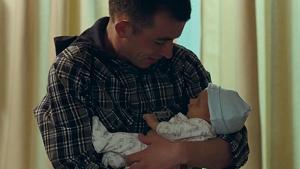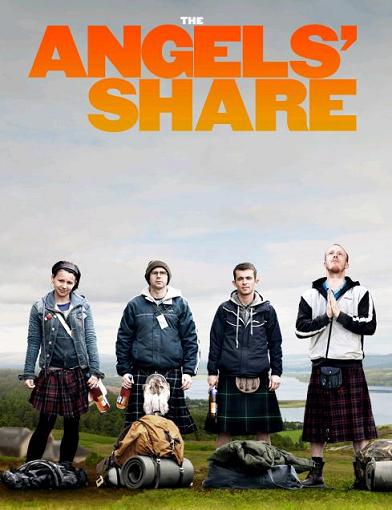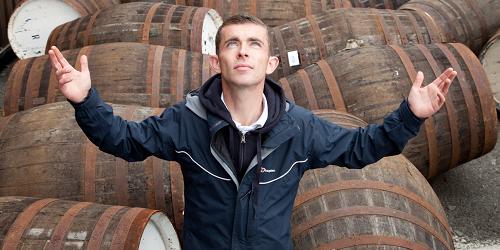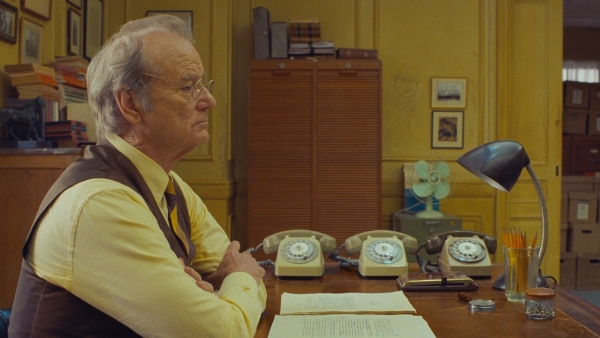
Lest anyone form an early reaction to The Angel’s Share that unfairly paints the film as a riff on Alexander Payne’s Sideways, there are two characteristics present in the former that distinguish it from the latter: social drama and a heist caper. Put another way, Ken Loach’s twenty fifth picture (and also his latest production with screenwriter Paul Laverty) engages on a macro, political level instead of a micro, personal level while managing to disguise itself as frothy entertainment. For another comparison, let your mind wander back to 1997’s The Full Monty; that may offer a better idea of what The Angel’s Share has to offer in its mixture of legitimate societal concerns and bawdy, witty humor.
 Make no mistake, The Angel’s Share contains belly laughs in spades and , but it’s the way Loach and Laverty root their narrative in a very real, very tangible human circumstance that gives the film its timbre. After a brief introductory sequence in which a number of people are sentenced to hours of community service as punishment for crimes ranging from petty misdemeanors to assault, The Angel’s Share‘s focus lands squarely on the shoulders of Robbie (Paul Brannigan), guilty of beating another man within an inch of his life over an imagined slight. The scar on Robbie’s face tells us a tale of a remorseless career thug, but it’s a false impression that The Angel’s Share begins erasing mere moments after we meet him.
Make no mistake, The Angel’s Share contains belly laughs in spades and , but it’s the way Loach and Laverty root their narrative in a very real, very tangible human circumstance that gives the film its timbre. After a brief introductory sequence in which a number of people are sentenced to hours of community service as punishment for crimes ranging from petty misdemeanors to assault, The Angel’s Share‘s focus lands squarely on the shoulders of Robbie (Paul Brannigan), guilty of beating another man within an inch of his life over an imagined slight. The scar on Robbie’s face tells us a tale of a remorseless career thug, but it’s a false impression that The Angel’s Share begins erasing mere moments after we meet him.
How does a person break out of the cycles of violence that have shaped his entire existence? Through undiscovered skills and talents, and with the unbidden kindness of a stranger. Robbie, soon to be a new father, strives to start fresh in a culture that quite frankly has little interest in helping him become someone other than the violent offender it pegs him as; it’s not until the birth of his son that he finds a path to atonement thanks to Harry (John Henshaw), the officer in charge of Robbie’s payback group and a major whiskey aficionado to boot. Together, they toast to Robbie’s joy, an act that opens up a whole new world to the young man as well as the chance for a better life for his child and his girlfriend, Leonie (Siobhan Reilly).
On paper, The Angel’s Share reads like topical po-faced cinema, and to an extent it is. Robbie’s plight isn’t imagined; there are people in Scotland, and indeed across the span of the globe, who struggle against the exact same prejudices Robbie contends with in the film. Maybe some of us have a hard time mustering sympathy for the devil; when the film eventually depicts the brutality of Robbie’s crime in flashback, we naturally empathize with his victim. But despite his transgression, there’s a sense that behind the camera, Loach and Laverty are rooting for Robbie to make good on his second chance.

Their compassion is infectious. Robbie, after all, is no devil, just a product of a cruel behavioral ouroboros that he can’t escape from. There’s some sins of the father stuff in here, nothing that allows Robbie to shirk personal responsibility for his actions but enough to make us question how bad a person he really is. Ultimately, it’s Brannigan’s acting that does the bulk of the work to make us sympathetic toward Robbie; he builds the role with layers of humanity, some noble, others less so, but they make for a vivid, moving, and excellent character portrait when taken together. (Small wonder that in his acting debut, Brannigan has already earned significant awards attention at home.)
All of the sociological elements at play in The Angel’s Share should incite outrage among more charitable viewers- clearly the problems faced by Robbie and other young people like him weigh heavily on the minds behind the lens. But the film also happens to be funny, particularly as Robbie and his community service cohorts scheme to pilfer the contents of a cask containing the holy grail of all whiskeys in the third act. Once a sneak, always a sneak, perhaps, but the point here may well be that they have few other options for turning over a new leaf. In the end, the opposing sides of The Angel’s Share harmonize with one another- the comedy beats balance out the dramatic flourishes and vice versa.

That equilibrium comes courtesy of seventeen years of repeated collaboration between Loach and Laverty, who have worked on eleven films together since 1996. (Nine features, two shorts.) It’s unusual, to say the least, to see a filmmaker and a screenwriter maintain a working partnership for this long, but they make good movies together so maybe it’s best not to look a gift horse in the mouth in their case. Refreshingly, they don’t feel pigeonholed into taking the obvious path toward a conclusion; that lets them get away with turning Robbie’s redemption song into an Ocean’s Eleven riff quite handily. (It helps that the climactic bit of larceny favors rubber hoses and head lamps over high-tech chicanery and hijinks, preserving the film’s sense of reality.)
G-S-T Ruling:
The Angel’s Share ends on several cheery notes efficacious enough to make the entire picture resonate as a light, charming way of killing a couple of hours. But that’s its great feat. Anybody can watch and enjoy it, and no doubt it will find an audience among Americans with a fondness for comic British fare, but this is a film that’s too anchored to be identified simply as fluff; it has too much compassion for its flawed protagonist and invests itself too strongly in his salvation for that qualifier to fit. You may walk away from The Angel’s Share smiling, but its spirit will almost certainly resonate with you more than its punchlines.


